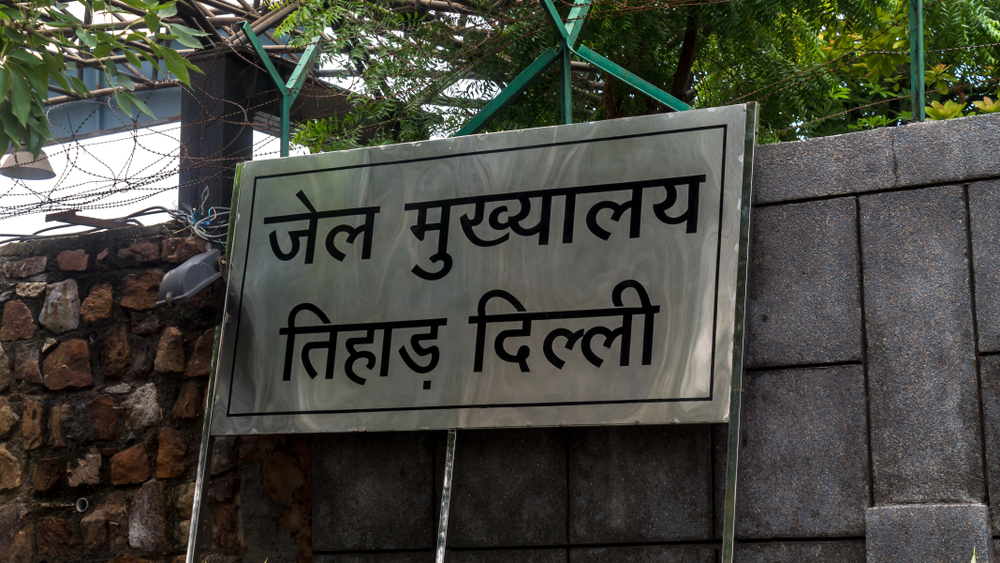A woman member of the Pinjra Tod group, who was arrested in a case related to the communal violence in North East Delhi, alleged on Wednesday in the Delhi High Court that there was a "large scale violence" inside Tihar Jail here on June 16 and inmates were prohibited from getting in touch with anyone, including via video conferencing, outside the prison.
The submission was made before Justice C Hari Shankar by the lawyer appearing for Pinjra Tod group member Natasha Narwal, that there was a violence and some inmates' limbs were allegedly broken by the jail staff.
The lawyer said prisoners, including Narwal, were also intimidated by the jail staff.
During the hearing held on Wednesday morning through video conferencing, the allegation of not allowing inmates from getting in touch with persons outside jail through video conferencing, was vehemently denied by Delhi government standing counsel (criminal) Rahul Mehra, who said according to instructions he received from the Director General of Prisons there was a connectivity issue, which was being resolved, and that is why video conferences could not be held.
However, Narwal's lawyer said that the person operating the video conference facility in the jail had informed him that due to violence in the prison, there was a lockdown.
The high court, thereafter, asked Mehra to file his status report which had to be filed by today (June 24) as per the earlier order and listed the matter for further hearing on June 29.
It also asked Mehra to look into the woman's grievance that the daily five minute call to family members, allowed to prisoners under the rules, was not being made available to her.
Narwal, who is a student of Jawaharlal Nehru University (JNU) has moved the high court seeking daily access to her lawyer and to carry books and reading materials in prison.
Legal interviews of inmates with their lawyers were suspended in Delhi prisons in view of the COVID-19 pandemic.
Pinjra Tod (Break the Cage) was founded in 2015 with an aim to make hostels and paying guest accommodations less restrictive for women students.
In 2015, Jamia Millia Islamia University had issued a notice restricting female students to stay out after 8 pm.
When the Delhi Commission for Women (DCW) questioned the Jamia administration on it, a group of women students decided to protest against the restrictions not only in Jamia but other universities in Delhi.
Later named as Pinjra Tod, the group mobilised people around several issues faced by female residents of hostels and PGs.
Narwal, who is currently lodged in Tihar jail along with another JNU student and member of the group, Devangana Kalitha, were arrested by the Delhi Police on May 23 in connection with a protest against the Citizenship (Amendment) Act in North East Delhi's Jafrabad area in February.
On May 24, they were granted bail by the trial court in the case, but moments later the Delhi Police crime branch had moved an application seeking to interrogate them and formally arrest them in a separate case.
In her plea, Narwal has sought direction to the Tihar Jail to allow her daily access to her advocates by way of video conferencing as the video-link system is already set-up in the prison premises.
She has also sought direction to the jail authorities to follow the Delhi Prison Rules, 2018 and allow access to books and reading material to complete her M.Phil. allow the Petitioner who is an academic of repute access to books and reading material in jail in order to complete her MPhil.
In order for the petitioner (Narwal) to effectively exercise her constitutional right to legal representation under Article 21, for the purpose of a fair trial/ fair investigation, she needs to be allowed to communicate with her counsel.
However, the jail mulaqaat/legal interviews have been suspended due to the Covid-19 epidemic.
The Delhi Prison Rules in any case permit the Jail Superintendent to facilitate communication between the Prisoner and her family, friends, and lawyers, by digital, electronic as well as telecommunication systems, she said in the plea.
Narwal was also arrested in a third case related to her role in north-east Delhi violence matter.
The case in which Narwal was arrested on May 23 was registered for the alleged offences of rioting, obstructing public servant and disobedience of order, abetment of an offence, wrongful restraint and assaulting or using criminal force to deter public servant from discharging duty under the Indian Penal Code.
The case in which she was arrested on May 24 was registered for the alleged offences of rioting, unlawful assembly, assault or criminal force to deter public servant from discharge of his duty, voluntarily causing hurt, murder, attempt to murder and criminal criminal conspiracy under the IPC, relevant sections of the Arms Act and Prevention of Damage to Public Property Act.
Communal clashes had broken out in northeast Delhi on February 24 after violence between citizenship law supporters and protesters spiralled out of control leaving at least 53 people dead and around 200 injured.











